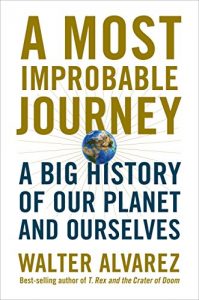Famed geologist Walter Alvarez expands our view of human history by revealing the cosmic, geologic, and evolutionary forces that have shaped us.
One in a million doesn’t even come close.
Not when we’re talking about the odds that you would happen to be alive today, on this particular planet, hurtling through space. Almost fourteen billion years of cosmic history, over four billion years of Earth history, a couple million years of human history, the rise and fall of nations, the unbroken string of generations necessary to lead to you—it’s staggering to consider. Yet behind everything in our world, from the phone in your pocket to even the force of gravity itself, lies a similarly grand procession of highly improbable events.
This panoramic viewpoint has captured the imagination of historians and scientists alike, and together they’ve created a new field—Big History—that integrates traditional historical scholarship with scientific insights to study the full sweep of our universe and its past. Famed geologist Walter Alvarez—best known for the impact theory explaining dinosaur extinction—has championed a science-first approach to Big History, and A Most Improbable Journey is one of the first Big History books to be written by a scientist rather than a historian. Alvarez brings his unique expertise and infectious curiosity to give us a new appreciation for the incredible occurrences—from the Big Bang to the formation of supercontinents, the dawn of the Bronze Age, and beyond—that have led to our improbable place in the universe.






